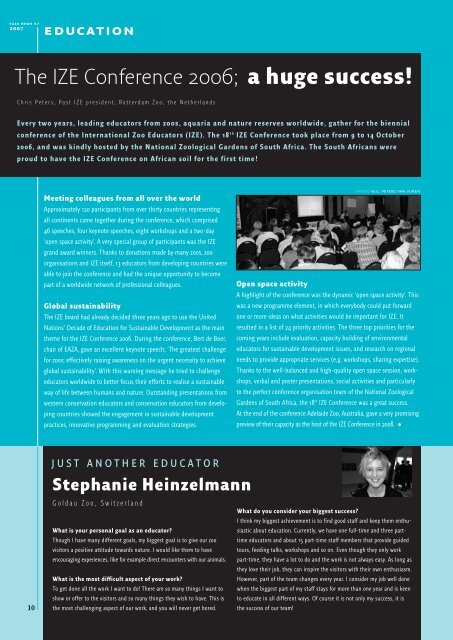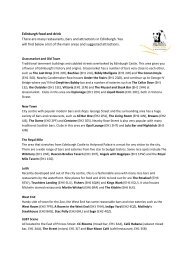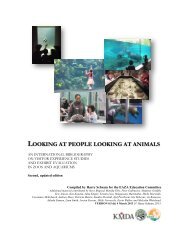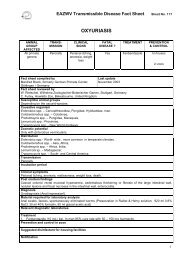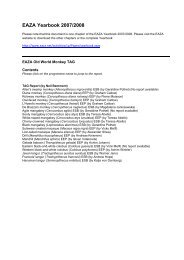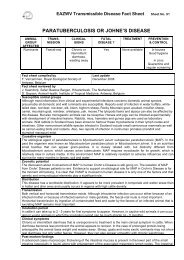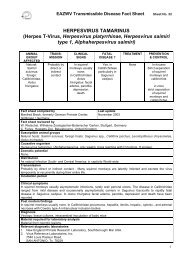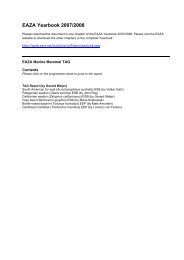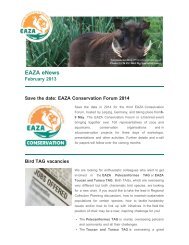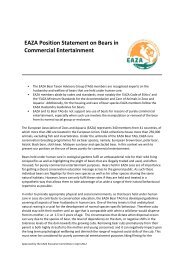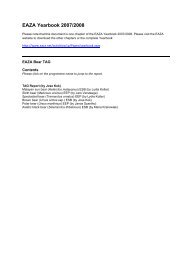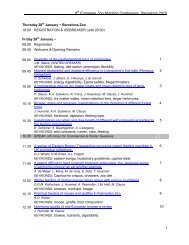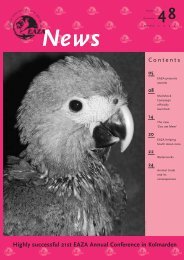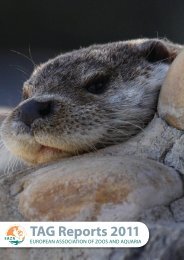EAZA News 57-12 - European Association of Zoos and Aquaria
EAZA News 57-12 - European Association of Zoos and Aquaria
EAZA News 57-12 - European Association of Zoos and Aquaria
You also want an ePaper? Increase the reach of your titles
YUMPU automatically turns print PDFs into web optimized ePapers that Google loves.
eaza news <strong>57</strong><br />
2007<br />
education<br />
Meeting colleagues from all over the world<br />
Approximately <strong>12</strong>0 participants from over thirty countries representing<br />
all continents came together during the conference, which comprised<br />
46 speeches, four keynote speeches, eight workshops <strong>and</strong> a two-day<br />
‘open space activity’. A very special group <strong>of</strong> participants was the IZE<br />
gr<strong>and</strong> award winners. Thanks to donations made by many zoos, zoo<br />
organisations <strong>and</strong> IZE itself, 13 educators from developing countries were<br />
able to join the conference <strong>and</strong> had the unique opportunity to become<br />
part <strong>of</strong> a worldwide network <strong>of</strong> pr<strong>of</strong>essional colleagues.<br />
Global sustainability<br />
The IZE board had already decided three years ago to use the United<br />
Nations’ Decade <strong>of</strong> Education for Sustainable Development as the main<br />
theme for the IZE Conference 2006. During the conference, Bert de Boer,<br />
chair <strong>of</strong> <strong>EAZA</strong>, gave an excellent keynote speech; ‘The greatest challenge<br />
for zoos; effectively raising awareness on the urgent necessity to achieve<br />
global sustainability’. With this warning message he tried to challenge<br />
educators worldwide to better focus their efforts to realise a sustainable<br />
way <strong>of</strong> life between humans <strong>and</strong> nature. Outst<strong>and</strong>ing presentations from<br />
western conservation educators <strong>and</strong> conservation educators from developing<br />
countries showed the engagement in sustainable development<br />
practices, innovative programming <strong>and</strong> evaluation strategies.<br />
just another educator<br />
Stephanie Heinzelmann<br />
Goldau Zoo, Switzerl<strong>and</strong><br />
What is your personal goal as an educator?<br />
Though I have many different goals, my biggest goal is to give our zoo<br />
visitors a positive attitude towards nature. I would like them to have<br />
encouraging experiences, like for example direct encounters with our animals.<br />
What is the most difficult aspect <strong>of</strong> your work?<br />
To get done all the work I want to do! There are so many things I want to<br />
show or <strong>of</strong>fer to the visitors <strong>and</strong> so many things they wish to have. This is<br />
the most challenging aspect <strong>of</strong> our work, <strong>and</strong> you will never get bored.<br />
photo rob doolaard/izp<br />
The IZE Conference 2006; a huge success!<br />
Chris Peters, Past IZE president, Rotterdam Zoo, the Netherl<strong>and</strong>s<br />
Every two years, leading educators from zoos, aquaria <strong>and</strong> nature reserves worldwide, gather for the biennial<br />
conference <strong>of</strong> the International Zoo Educators (IZE). The 18 th IZE Conference took place from 9 to 14 October<br />
2006, <strong>and</strong> was kindly hosted by the National Zoological Gardens <strong>of</strong> South Africa. The South Africans were<br />
proud to have the IZE Conference on African soil for the first time!<br />
10<br />
photo w.g. peters-van vuren<br />
Open space activity<br />
A highlight <strong>of</strong> the conference was the dynamic ‘open space activity’. This<br />
was a new programme element, in which everybody could put forward<br />
one or more ideas on what activities would be important for IZE. It<br />
resulted in a list <strong>of</strong> 24 priority activities. The three top priorities for the<br />
coming years include evaluation, capacity building <strong>of</strong> environmental<br />
educators for sustainable development issues, <strong>and</strong> research on regional<br />
needs to provide appropriate services (e.g. workshops, sharing expertise).<br />
Thanks to the well-balanced <strong>and</strong> high-quality open space session, workshops,<br />
verbal <strong>and</strong> poster presentations, social activities <strong>and</strong> particularly<br />
to the perfect conference organisation team <strong>of</strong> the National Zoological<br />
Gardens <strong>of</strong> South Africa, the 18th IZE Conference was a great success.<br />
At the end <strong>of</strong> the conference Adelaide Zoo, Australia, gave a very promising<br />
preview <strong>of</strong> their capacity as the host <strong>of</strong> the IZE Conference in 2008. •<br />
What do you consider your biggest success?<br />
I think my biggest achievement is to find good staff <strong>and</strong> keep them enthusiastic<br />
about education. Currently, we have one full-time <strong>and</strong> three parttime<br />
educators <strong>and</strong> about 15 part-time staff members that provide guided<br />
tours, feeding talks, workshops <strong>and</strong> so on. Even though they only work<br />
part-time, they have a lot to do <strong>and</strong> the work is not always easy. As long as<br />
they love their job, they can inspire the visitors with their own enthusiasm.<br />
However, part <strong>of</strong> the team changes every year. I consider my job well done<br />
when the biggest part <strong>of</strong> my staff stays for more than one year <strong>and</strong> is keen<br />
to educate in all different ways. Of course it is not only my success, it is<br />
the success <strong>of</strong> our team!


